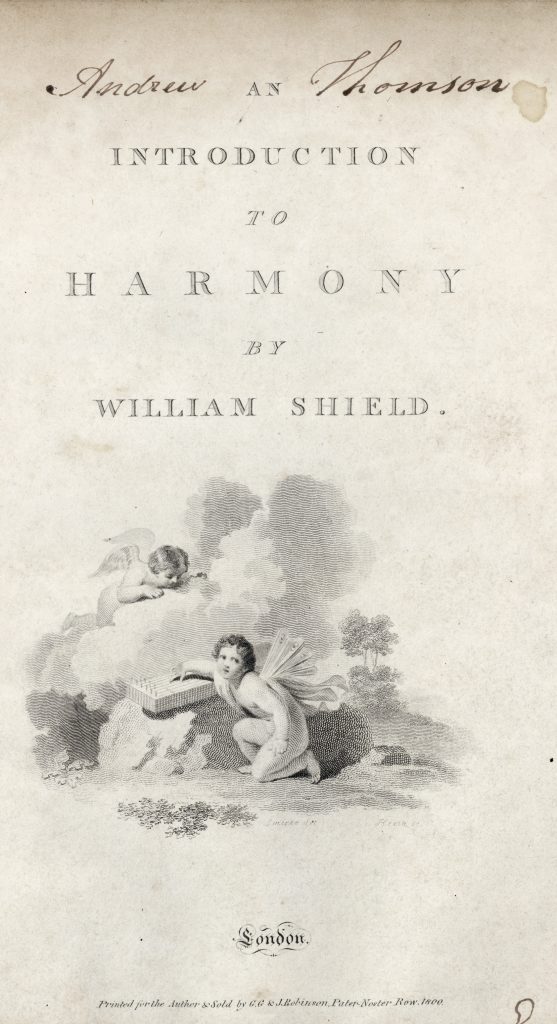
Image from ‘An Introduction to Harmony by William Shield’ (18th Century Collection 780 SHI)
25th January, Burns’ Night, has just passed for 2017. The day (and evening!) celebrates the birth, life, and work of famous Scot Robert (‘Rabbie’) Burns (1759-1796). Regarded as the national poet of Scotland, Burns composed many folk songs. He also collected songs and adapted them for his own use.
To many, he is best-known for his anthem ‘Auld Lang Syne’, which is often sung (in Scotland and throughout the world) at New Year. Burns ‘wrote’ the words for ‘Auld Lang Syne’ in about 1788 and sent a copy of the original song to the Scots Musical Museum with the remark,
“The following song, an old song, of the olden times, and which has never been in print, nor even in manuscript until I took it down from an old man.”
Some of the lyrics were indeed “collected” rather than composed by the poet; the ballad “Old Long Syne” printed in 1711 by James Watson shows considerable similarity in the first verse and the chorus to Burns’ later poem, and is almost certainly derived from the same “old song”.
25 January also marks the anniversary of composer William Shield, who died on the same day in 1829. Shield was born in Swalwell, Gateshead, on 5 March 1748 and was taught music by his father before becoming an apprentice shipbuilder in South Shields following the death of his mother. He continued studying music with Charles Avison, church organist at St John’s Church in Newcastle, and moved to London in 1772 to play violin in the opera at Covent Garden (later the Royal Opera House). He met Joseph Haydn and, in 1817, was appointed Master of the King’s Musick.
Like Burns, Shield was a great plunderer of folk tunes, often incorporating them into his own compositions. He is often cited as being the composer of the tune of Burns’ ‘Auld Lang Syne’. In 1998, John Treherne, Gateshead’s Head of Schools’ Music Service, studied Shield’s score for his operetta Rosina (1782):
“I started to copy out the score and hummed the tune as I was writing it down. I was coming to the end when I realised the tune floating through my head was Auld Lang Syne.”
Had Burns ‘stolen’ the tune from Shield and taken credit for it? It’s more likely that Shield knew the tune of a traditional Scottish folk song and used it in Rosina to convey a Scottish atmosphere. The same could probably be said of Burns: he may have ‘stolen’ the tune from Rosina, but it’ more likely that he borrowed from a traditional Scottish tune that he’d heard somewhere. The debate has raged on for years, with north-of-England folk song traditionalists claiming that it was their local lad who composed the tune to one of the most-performed songs ever.
Shield’s ‘An Introduction to Harmony by William Shield’ (18th Century Collection 780 SHI) was published in 1800. This comprehensive treatise on the elements of harmony shows Shield’s encyclopedic knowledge of local and more ‘exotic music’ by using (unnamed) excerpts of existing music as exercises and examples. Shield’s ‘Introduction’ is, in fact, composed of an anthology drawn from music in his own library, including obscure pieces never reproduced before.
A second edition appeared in 1817. In the preface to Part the Second, Shield explains his reasons for using excerpts of existing music:
“. . . it has appeared to me the most liberal plan to let every musical illustrative example recommend itself by its own intrinsic merit, and not by the name of its author.”
Is this what Shield possibly felt when he first heard the theme he adapted in Rosina? Or what Burns experienced when he heard the tune he appropriated an obscure air for ‘Auld Lang Syne’?
Shield’s ‘Introduction’ met with varying reviews on its publication. The Gentleman’s Magazine and Historical Chronicle, although acknowledging Shield’s genius and popularity, dismissively stated:
“This work has proved serviceable by enticing grown-up lady-performers to acquire some knowledge of musical theory.”
Robert Burns, 25 January 1759 – 21 July 1796. William Shield, 5 March 1748 – 25 January 1829.
